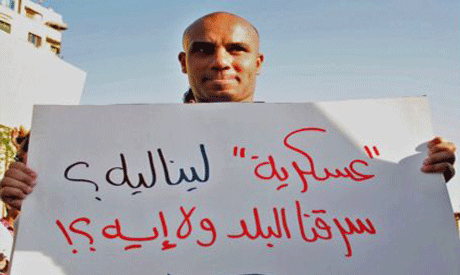
A protestor against military trial holding a banner reading "Why military trials for us? Did we steal the country's money or what?" (Photo by: Mai Shaheen)
Bloggers in Egypt today dedicate much of their time and energy to tracking military trials of civilians and lobbying against them. A number of such blogs have been compiled in a Facebook page entitled "1st of June" — declared a day of blogging against military trials.
Blogs on both Facebook and on Twitter under #NOSCAF highlight the anger building up for weeks against military trials of activists, and human rights violations during military trials, especially after one army general admitted to CNN yesterday that the army conducted virginity tests on women activists, ostensibly so that they don’t claim that they were raped by army officers.
The general, who spoke anonymously to CNN, which led to uproar among activists and bloggers, especially after his provocative statement “These girls are not like your daughter or mine. These were girls who had camped out in tents with male protesters in Tahrir Square ... None of them were virgins.”
Many activists will not go to the Revolution Youth Coalition meeting with the Supreme Council of the Armed Forces (SCAF) today in protest against military trials which are estimated by lawyers to exceed 5000 cases. Many will go to protest in front of Al-Galaa Theatre where SCAF is holding its meeting.
Blogs express why activists are against military trials for civilians and why they pose a threat to the revolution and its core principles of freedom, dignity and justice.
The blog “Why military trials?” asserts: "The SCAF can't by any mean arrest someone in a peaceful protest or even interrogate someone based on his opinion. I think the SCAF can't handle dealing with politics and difference of opinion because the military is used to giving orders and [having them followed]. Politics is based on differences of opinion [regarding] the future of the country and what should or should not be done."
Other blogs simply pay tribute to those who were put in military prisons after hasty and often unfair military trials. “Diaries under military rule” includes a list of testimonies with names and photos of young people in military prisons. For example:
Mohammed Adel, 23,
He was arrested on 28 January, and he lost all his personal belongings in the protests. He went to military trial and was sentenced to five years in prison, case number 2/2011. He is now in El- Wadi El-Gedid Prison.
Amr El Beheiri, 32,
He was arrested on 26 February in front of the Council of Ministers. He was in a sit-in demanding the resignation of Ahmed Shafiq the ex-prime minister and his government. He was beaten and insulted by some people and in three days he stood before a military court, was denied a lawyer, and sentenced to five years in prison, case number 155/2011.
Laila Sweif was witness to assault by the army and reported it to the general prosecutor in report number 2390 on 1 March. Still Beheiri is in prison for a crime he didn't commit.
Other blogs explain that activists are against military trials for anyone. In the blog “Live shooting. Why military trials? Is Mubarak back?”it is stated: "We are against military trials that use exceptional, emergency and military laws, not only for activists but for all civilians. Justice is justice. A thug has the right to a fair and civil trial; also a politician has the same right. Generals please, your military trials have nothing to do with us."
The blog goes on to explain the principles of fair trials and where military trials differ from these:
1. The right to protection against arbitrary arrest or attack. Military trials use emergency law and they insult and attack those they arrest. Like when they arrested Mohammed Effat and the officer asked him to get down on his knees.
2. Everyone arrested should be informed about his rights according to [UN human rights conventions]. Military trials not only don't tell you your rights, but also deny you any.
3. The right to a lawyer. Every detainee has the right to have a lawyer to defend him/her all through the trial’s procedures. This was also listed in UN declarations. In military trials, detainees are often denied lawyers, and sometimes lawyers arrive to find the trial already over and the detainees sentenced to prison. On other occasions, lawyers are denied access to the files of the case, like in Ahmed Mustafa’s case.
4. The right to have the arrest reported to family members. This doesn’t happen in military trials, and the families often find out by accident.
The list goes on to compare legal procedures and how they are not followed when it comes to military trials.
Short link: